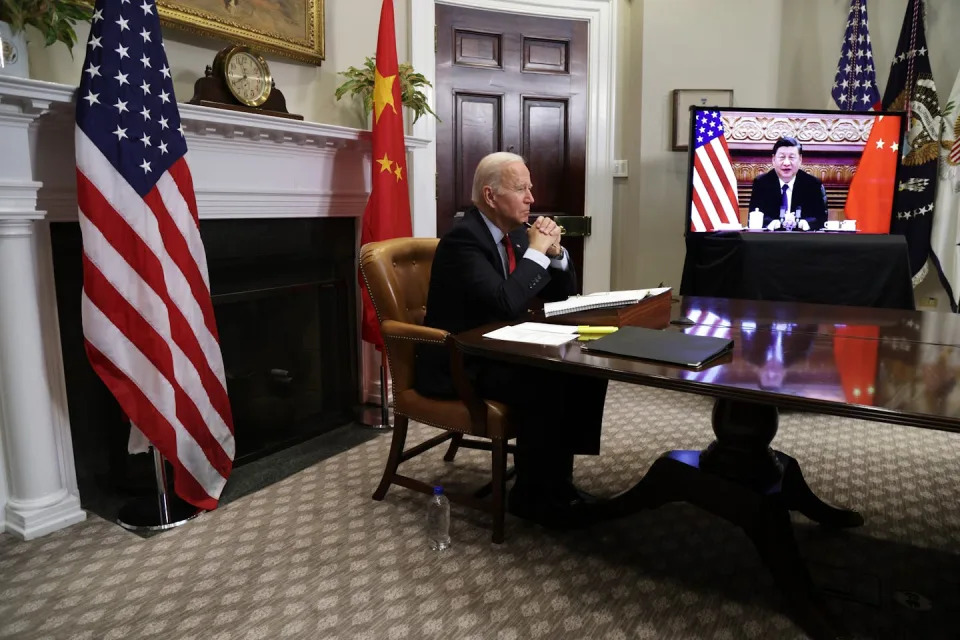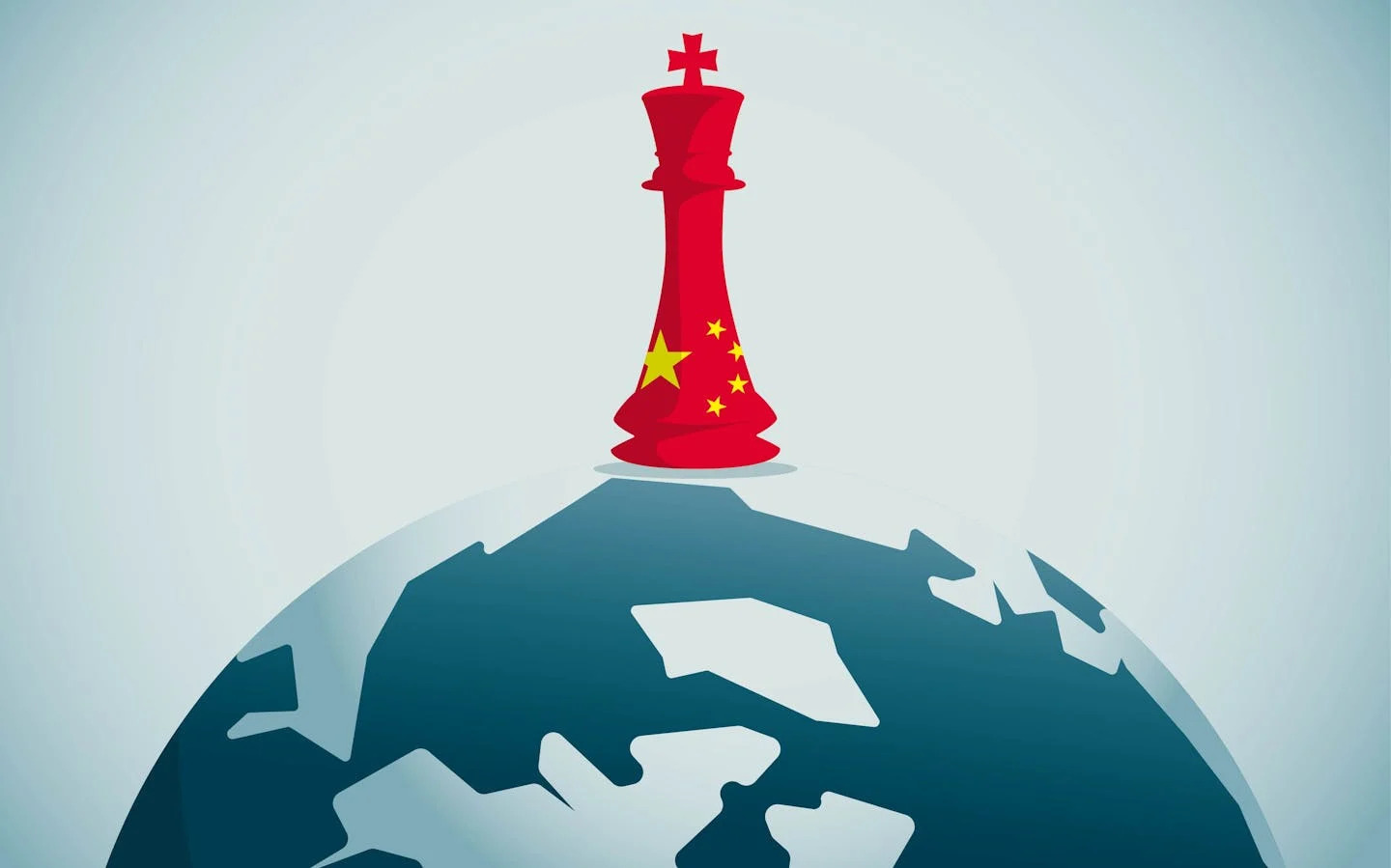Is the United States overestimating China’s power?

Which country is the greatest threat to the United States? The answer, according to a large proportion of Americans, is clear: China.
Made it, Mao! Top of the World?
Half of all Americans responding to a mid-2023 survey from the Pew Research Center cited China as the biggest risk to the U.S., with Russia trailing in second with 17%. Other surveys, such as from the Chicago Council on Global Affairs, show similar findings.
Senior figures in recent U.S. administrations appear to agree with this assessment. In 2020, John Ratcliffe, director of national intelligence under President Donald Trump, wrote that Beijing “intends to dominate the U.S. and the rest of the planet economically, militarily and technologically.”
The White House’s current National Defense Strategy is not so alarmist, referring to China as the U.S.’s “pacing challenge” – a reference that, in the words of Secretary of Defense Lloyd Austin, apparently means China has “the intent to reshape the international order and, increasingly, the power to do so.”
As someone who has followed China for over a quarter century, I believe that many observers have overestimated the country’s apparent power. Recent challenges to China’s economy have led some people to reevaluate just how powerful China is. But hurdles to the growth of Chinese power extend far beyond the economic sector – and failing to acknowledge this reality may distort how policymakers and the public view the shift of geopolitical gravity in what was once called “the Chinese century.”
In overestimating China’s comprehensive power, the U.S. risks misallocating resources and attention, directing them toward a threat that is not as imminent as one might otherwise assume.
Let me be clear: I’m not suggesting that China is weak or about to collapse. Nor am I making an argument about China’s intentions. But rather, it is time to right-size the American understanding of the country’s comprehensive power. This process includes acknowledging both China’s tremendous accomplishments and its significant challenges. Doing so is, I believe, mission critical as the United States and China seek to put a floor underneath a badly damaged bilateral relationship.
Headline numbers
Why have so many people misjudged China’s power?
One key reason for this misconception is that from a distance, China does indeed appear to be an unstoppable juggernaut. The high-level numbers bedazzle observers: Beijing commands the world’s largest or second-largest economy depending on the type of measurement; it has a rapidly growing military budget and sky-high numbers of graduates in engineering and math; and oversees huge infrastructure projects – laying down nearly 20,000 miles of high-speed rail tracks in less than a dozen years and building bridges at record pace.
But these eye-catching metrics don’t tell a complete story. Look under the hood and you’ll see that China faces a raft of intractable difficulties.
The Chinese economy, which until recently was thought of as unstoppable, is beginning to falter due to deflation, a growing debt-to-gross domestic product ratio and the impact of a real estate crisis.
China’s other challenges
And it isn’t only China’s economy that has been overestimated.
While Beijing has put in considerable effort building its soft power and sending its leadership around the world, China enjoys fewer friends than one might expect, even with its willing trade partners. North Korea, Pakistan, Cambodia and Russia may count China as an important ally, but these relationships are not, I would argue, nearly as strong as those enjoyed by the United States globally. Even in the Asia-Pacific region there is a strong argument to say Washington enjoys greater sway, considering the especially close ties with allies Japan, South Korea and Australia.
Even though Chinese citizens report broad support for the Communist Party, Beijing’s capricious COVID-19 policies paired with an unwillingness to use foreign-made vaccines have dented perceptions of government effectiveness.

Further, China’s population is aging and unbalanced. In 2016, the country of 1.4 billion saw about 18 million births; in 2023, that number dropped to about 9 million. This alarming fall is not only in line with trends toward a shrinking working-age population, but also perhaps indicative of pessimism among Chinese citizens about the country’s future.
And at times, the actions of the Chinese government read like an implicit admission that the domestic situation is not all that rosy. For example, I take it as a sign of concern over systemic risk that China detained a million or more people, as has happened with the Muslim minority in Xinjiang province. Similarly, China’s policing of its internet suggests concerns over collective action by its citizens.
The sweeping anti-corruption campaign Beijing has embarked on, purges of the country’s military and the disappearance of leading business figures all hint at a government seeking to manage significant risk.
I hear many stories from contacts in China about people with money or influence hedging their bets by establishing a foothold outside the country. This aligns with research that has shown that in recent years, on average as much money leaves China via “irregular means” as for foreign direct investment.
A three-dimensional view
The perception of China’s inexorable rise is cultivated by the governing Communist Party, which obsessively seeks to manufacture and control narratives in state media and beyond that show it as all-knowing, farsighted and strategic. And perhaps this argument finds a receptive audience in segments of the United States concerned about its own decline.
It would help explain why a recent Chicago Council on Global Affairs survey found that about a third of American respondents see the Chinese and American economies as equal and another third see the Chinese economy as stronger. In reality, per capita GDP in the United States is six times that of China.
Of course, there is plenty of danger in predicting China’s collapse. Undoubtedly, the country has seen huge accomplishments since the People’s Republic of China’s founding in 1949: Hundreds of millions of people brought out of poverty, extraordinary economic development and impressive GDP growth over several decades, and growing diplomatic clout. These successes are especially noteworthy given that the People’s Republic of China is less than 75 years old and was in utter turmoil during the disastrous Cultural Revolution from 1966 to 1976, when intellectuals were sent to the countryside, schools stopped functioning and chaos reigned. In many cases, China’s successes merit emulation and include important lessons for developing and developed countries alike.
China may well be the “pacing challenge” that many in the U.S. believe. But it also faces significant internal challenges that often go under-recognized in evaluating the country’s comprehensive power.
And as the United States and China seek to steady a rocky relationship, it is imperative that the American public and Washington policymakers see China as fully three-dimensional – not some flat caricature that fits the needs of the moment. Otherwise, there is a risk of fanning the flames of xenophobia and neglecting opportunities for partnership that would benefit the United States.
- Questions and Answers
- Opinion
- Motivational and Inspiring Story
- Technology
- Live and Let live
- Focus
- Geopolitics
- Military-Arms/Equipment
- Securitate
- Economy
- Beasts of Nations
- Machine Tools-The “Mother Industry”
- Art
- Causes
- Crafts
- Dance
- Drinks
- Film/Movie
- Fitness
- Food
- Jocuri
- Gardening
- Health
- Home
- Literature
- Music
- Networking
- Alte
- Party
- Religion
- Shopping
- Sports
- Theater
- Health and Wellness
- News
- Culture


